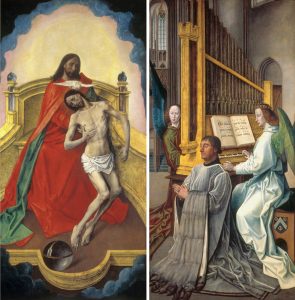Illuminations on the Lectionary readings for June 4, 2023 (Trinity Sunday A)
First Reading: Genesis 1:1-2:4a
In recent weeks we have celebrated the resurrected Jesus ascending into heaven to sit at the right hand of the Father, and the Holy Spirit coming to the followers of Jesus in wind and fire.

Trinity Altarpiece (c.1480), two panels from an oil painting on wood panels depicting Sir Edward Boncle (portrait on the right panel) in adoration of the Trinity (left panel) by Hugo van der Goes (c.1440-1482). Scottish National Gallery, Edinburgh. (Click image to enlarge)
Now as we begin the long season after Pentecost we contemplate Father, Son and Holy Spirit in their mysterious dance, three persons in one triune God, the Holy Trinity. Our first reading, the first creation story at the beginning of Genesis, shows a monotheistic God as a loving creative force at work in the world as Creator, Word, and Spirit wind moving over the waters to make a world.
Psalm: Psalm 8
In Psalm 8, beautiful hymn of praise, we exalt the name of our Creator God and sing grateful thanksgiving for all of creation. We remember that, as part of our God-given dominion over “the beasts of the field, the birds of the air, and the fish of the sea,” we have a solemn duty to preserve and protect them all. This duty feels more significant than ever in this time of mass extinction, rising oceans, and chaotic climate change.
Alternate Psalm: Canticle 13
Canticles, “little songs,” are scripture passages provided by the Book of Common Prayer for use in daily prayer and as occasional substitutes for Lectionary Psalms. Canticle 13 is the Song of the Three Young Men from the Apocryphal Prayer to Azariah. The young men, condemned to death in a fiery furnace by an angry king, marched through the flames unharmed thanks to God’s protection, singing this joyous hymn of praise to God and all creation. These verses, added to this old song in modern Christian times, conclude the Canticle with resounding praise and exaltation to the Trinity: Father, Son, and Holy Spirit.
Second Reading: 2 Corinthians 13:11-13
Paul closes his second letter to the people of Corinth in the formal style dictated for letters in 1st Century Greek culture. In brief but loving words, he urges this small, often squabbling congregation to sort out their conflicts, pay attention to each other, and love one another as God loves them. In what may be one of early Christianity’s first explicit references to a divine Trinity, Paul blesses the people with his hope for the grace of Jesus, the love of God and the communion of the Holy Spirit.
Gospel: Matthew 28:16-20
Each of the four Gospels ends in a different way, offering us four contrasting views of the resurrected Jesus and his conversations with the disciples who would remain behind as he returns to the Father. In this lectionary year we hear Matthew’s narrative. According to this account, when the women saw Jesus at the tomb, he directed them to tell the remaining eleven disciples to go on to Galilee, where he would meet them. Now they are together again, reunited on a Galilean mountain. Some of them worship him, but others remain doubtful. Then Jesus issues what later Christianity would call The Great Commission, commanding them to go and “make disciples of all nations, baptizing them in the name of the Father, Son and Holy Spirit.”
